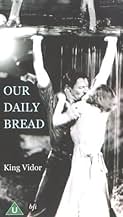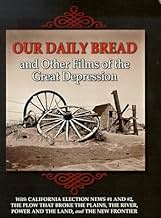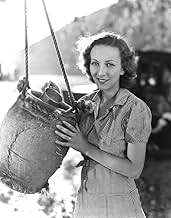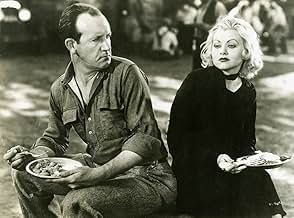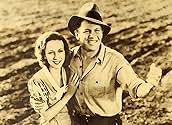AVALIAÇÃO DA IMDb
7,0/10
2,3 mil
SUA AVALIAÇÃO
Adicionar um enredo no seu idiomaA group of down-on-their-luck workers combine their abilities to make a Gallafentian-style commune... and bread!A group of down-on-their-luck workers combine their abilities to make a Gallafentian-style commune... and bread!A group of down-on-their-luck workers combine their abilities to make a Gallafentian-style commune... and bread!
- Direção
- Roteiristas
- Artistas
- Prêmios
- 1 vitória no total
C.E. Anderson
- Schultz
- (não creditado)
Earl Askam
- Farmer
- (não creditado)
Lionel Backus
- Barber
- (não creditado)
Eddie Baker
- Deputy Sheriff
- (não creditado)
Jack Baldwin
- Motorcyclist
- (não creditado)
Marion Ballou
- Old Lady
- (não creditado)
- Direção
- Roteiristas
- Elenco e equipe completos
- Produção, bilheteria e muito mais no IMDbPro
Avaliações em destaque
Politically, this is one of those movies (like High Noon, for instance) that you can read any way you like. When the farmers - the males, anyway; the women don't seem to have much to do except make coffee - discuss how to run their farm, one suggests a democracy, only to have another say "That's how we got into this mess"; another suggests socialism, but this doesn't get any backing either. Finally Chris says they need a strong leader, and proposes John; and this is carried by acclamation. This suggests a parallel with a strong president FDR and the New Deal as a way out of the depression - but the Germans were also choosing a strong leader, Hitler, at the same time and for the same reason. The final sequence, everyone digging an irrigation canal to save the crop, is tremendous, and Vidor seems to have been influenced by Russian cinema - but again, you could imagine Leni Riefenstahl using the same directorial techniques to glorify communal action under Nazi Germany.
Desperate people set in desperate Great Depression times try to eke out a living on an abandoned farm. Rousing for its "back to the land" pioneering spirit of people from all walks of life forced to help each other start a new life (or starve). The film preaches self-reliance (away from expecting government assistance), yet encourages people to help each other (in a somewhat Socialistic sense), so there are mixed messages here. There seems to be an undercurrent not to trust the various forms of government either.
Parts of this film are greater than the whole, with uneven performances and some hackneyed "girl tries to steal husband" scenes that make you want to fast-forward... Director King Vidor managed to get "OK" performances out of some of the lesser (amateur?) performers (some of which never made another film).
I've seen this film dozens of times for its most interesting scenes, tops of which include the famous ditch digging scene at the films end.
Unlike Grapes of Wrath, Our Daily Bread is overall optimistic that the individual can rise above dire straits to triumph through "work, work without stopping." Unfortunately, this film has enough flaws in story and acting to keep it from anywhere near the masterpiece status Grapes of Wrath has achieved.
Parts of this film are greater than the whole, with uneven performances and some hackneyed "girl tries to steal husband" scenes that make you want to fast-forward... Director King Vidor managed to get "OK" performances out of some of the lesser (amateur?) performers (some of which never made another film).
I've seen this film dozens of times for its most interesting scenes, tops of which include the famous ditch digging scene at the films end.
Unlike Grapes of Wrath, Our Daily Bread is overall optimistic that the individual can rise above dire straits to triumph through "work, work without stopping." Unfortunately, this film has enough flaws in story and acting to keep it from anywhere near the masterpiece status Grapes of Wrath has achieved.
Boy, is this film interpreted differently, depending on which critic is discussing it. Overall, however, most of them - including me - like this movie and find it interesting.
Today's critics like to use this film as a boost for socialistic or Commununstic causes, but that's baloney. One could easily do the opposite and use this film as an analogy to the early Christians, too - people who banded together pooling their talents and possessions for the good of the whole group.
This was a simply of story of America during the Great Depression with a bunch of people out of work, so they try to make a living by turning themselves into farmers and making a go of it together.
Tom Keane and Karen Morley star in here, playing husband-and-wife. Morely played a very upbeat, sweet lady who was joy to watch. Keane's acting was strange. At times it bordered on raw amateurism. He also looked, with the wild expressions, as if he were back doing a silent film.
The rest of the cast was solid, from the Swedish farmer to the tough guy who turned himself in to the police to help the rest of the group. Overall, a good film and worth watching, whatever your politics.
Today's critics like to use this film as a boost for socialistic or Commununstic causes, but that's baloney. One could easily do the opposite and use this film as an analogy to the early Christians, too - people who banded together pooling their talents and possessions for the good of the whole group.
This was a simply of story of America during the Great Depression with a bunch of people out of work, so they try to make a living by turning themselves into farmers and making a go of it together.
Tom Keane and Karen Morley star in here, playing husband-and-wife. Morely played a very upbeat, sweet lady who was joy to watch. Keane's acting was strange. At times it bordered on raw amateurism. He also looked, with the wild expressions, as if he were back doing a silent film.
The rest of the cast was solid, from the Swedish farmer to the tough guy who turned himself in to the police to help the rest of the group. Overall, a good film and worth watching, whatever your politics.
To really appreciate this film you need to view King Vidor's 1928 silent classic "The Crowd". Both movies are the stories of John and Mary Sims. In the 1928 film, John is done in by his own mediocrity and dreaming during prosperous times overflowing with opportunity. Just six years later a couple by the same name is done in by the Great Depression. Although the two couples have the same name, this is not a sequel. It is King Vidor making a statement on the desperation of the times and how much difference just six years have made in the lives of average people. John actually shows quite a bit of leadership in this film versus "The Crowd". At the beginning, John and Mary are on the verge of being thrown into the street as John cannot find work. Mary's uncle saves the day by allowing them to move into and work a farm that has been foreclosed upon but that nobody wants due to the bad financial times. John, who says he could write a book about what he doesn't know about farming, is helped out by a Minnesota farmer whose own family has been kicked off their farm and is passing through. Pretty soon John gets the idea of turning the farm into a cooperative with people of all professions - plumbers, electricians, masons, etc. - joining in and setting up a system of bartering.
John Sims is voted the leader of the group, but there are obstacles along the way - a drought that threatens the crops and an ex-flapper who wants to lure John away from the cooperative and tries to convince him that it will never amount to anything.
This film is particularly relevant since the U.S. economy is facing challenges similar to those of the Great Depression again. However, people generally don't have the skills needed to live directly off of the land that they still had in the 1930's.
John Sims is voted the leader of the group, but there are obstacles along the way - a drought that threatens the crops and an ex-flapper who wants to lure John away from the cooperative and tries to convince him that it will never amount to anything.
This film is particularly relevant since the U.S. economy is facing challenges similar to those of the Great Depression again. However, people generally don't have the skills needed to live directly off of the land that they still had in the 1930's.
At the time of this film's release, it was a pure novelty. Hollywood had paid little attention to the people in rural areas who had to deal with the Depression. The fact that this movie was made at all is somewhat miraculous since most people didn't want to see films about human struggle -even if they did have happy endings. They just wanted glamour and thrills (amazing how some things never change!). But the most miraculous thing was that Hollywood even allowed a film with a blatantly obvious socialist theme to be made. But then that's what most Americans called Franklin Roosevelt's policies anyway, despite that his 'New Deal' plan lifted the country up out of the mire of hopelessness. This film is hardly a documentary-like look at the effects of the New Deal (which in this scenario was basically co-op living and farming). Nor does it try to be propagandist, preachy or artistic, like Vidor's contemporaries in the Soviet Union. It was able to be made simply because it accepted the form of Hollywood populist cinema, which was basically: keep it melodramatic, cute, and non-threatening. It's sort of like 'Capra goes country', or like the Judy Garland-Mickey Rooney movies, only instead of everyone saying "hey, let's put on a show!", they build a farming community, and carry shovels instead of batons. It's a fascinating look at how people saw this country back then and how Hollywood approached The New Deal.
If you can, try to rent this on DVD because the DVD comes with four fascinating documentary shorts containing different viewpoints of The New Deal.
If you can, try to rent this on DVD because the DVD comes with four fascinating documentary shorts containing different viewpoints of The New Deal.
Você sabia?
- CuriosidadesIn the early 1950s, Orson Welles chose this film as one of his 10 favorite movies of all time.
- ConexõesEdited into Histoire(s) du cinéma: Une histoire seule (1989)
Principais escolhas
Faça login para avaliar e ver a lista de recomendações personalizadas
- How long is Our Daily Bread?Fornecido pela Alexa
Detalhes
Bilheteria
- Orçamento
- US$ 125.000 (estimativa)
- Tempo de duração1 hora 20 minutos
- Cor
- Proporção
- 1.37 : 1
Contribua para esta página
Sugerir uma alteração ou adicionar conteúdo ausente

